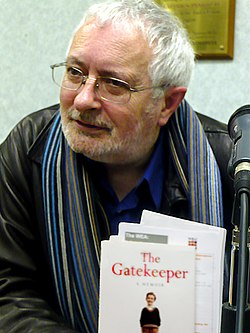Terry Eagleton Quote
If this constant sliding and hiding of meaning were true of conscious life, then we would of course never be able to speak coherently at all. If the whole of language were present to me when I spoke, then I would not be able to articulate anything at all. The ego, or consciousness, can therefore only work by repressing this turbulent activity, provisionally nailing down words on to meanings. Every now and then a word from the unconscious which I do not want insinuates itself into my discourse, and this is the famous Freudian slip of the tongue or parapraxis. But for Lacan all our discourse is in a sense a slip of the tongue: if the process of language is as slippery and ambiguous as he suggests, we can never mean precisely what we say and never say precisely what we mean. Meaning is always in some sense an approximation, a near-miss, a part-failure, mixing non-sense and non-communication into sense and dialogue.
If this constant sliding and hiding of meaning were true of conscious life, then we would of course never be able to speak coherently at all. If the whole of language were present to me when I spoke, then I would not be able to articulate anything at all. The ego, or consciousness, can therefore only work by repressing this turbulent activity, provisionally nailing down words on to meanings. Every now and then a word from the unconscious which I do not want insinuates itself into my discourse, and this is the famous Freudian slip of the tongue or parapraxis. But for Lacan all our discourse is in a sense a slip of the tongue: if the process of language is as slippery and ambiguous as he suggests, we can never mean precisely what we say and never say precisely what we mean. Meaning is always in some sense an approximation, a near-miss, a part-failure, mixing non-sense and non-communication into sense and dialogue.
Related Quotes
Put down your glass, it is time to dance. If you want to get drunk all you need is to drink love. Put down your pipe and do away with these childish toys. If you want to get high all you need is to br...
About Terry Eagleton
Eagleton has published over forty books, but remains best known for Literary Theory: An Introduction (1983), which has sold over 750,000 copies. The work elucidated the emerging literary theory of the period, as well as arguing that all literary theory is necessarily political. He has also been a prominent critic of postmodernism, publishing works such as The Illusions of Postmodernism (1996) and After Theory (2003). He argues that, influenced by postmodernism, cultural theory has wrongly devalued objectivity and ethics. His thinking is influenced by Marxism and Christianity.
Formerly the Thomas Warton Professor of English Literature at the University of Oxford (1992–2001) and John Edward Taylor Professor of Cultural Theory at the University of Manchester (2001–2008), Eagleton has held visiting appointments at universities around the world including Cornell, Duke, Iowa, Melbourne, Trinity College Dublin, and Yale.
Eagleton delivered Yale University's 2008 Terry Lectures and the University of Edinburgh's 2010 Gifford Lecture entitled The God Debate. He gave the 2010 Richard Price Memorial Lecture at Newington Green Unitarian Church, speaking on "The New Atheism and the War on Terror". In 2009, he published a book which accompanied his lectures on religion, entitled Reason, Faith, and Revolution: Reflections on the God Debate.
In July 2024, Eagleton was awarded an Honorary Doctorate by Lancaster University.
